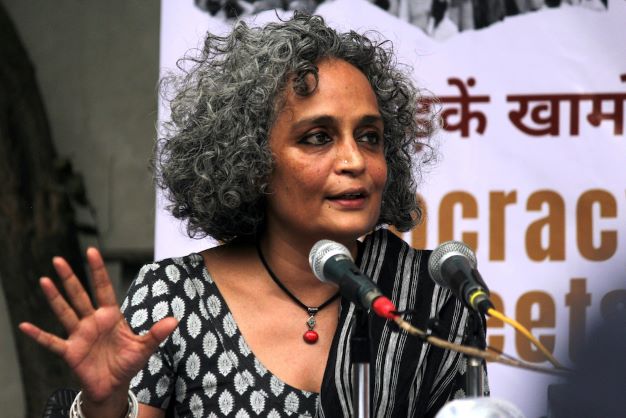


Delhi Lt Governor V K Saxena has given prosecution sanction against author Arundhati Roy and a former professor in Kashmir for allegedly making provocative speeches promoting the separation of Kashmir from India at an event in 2010. The FIR against them was registered on the complaint of a social activist and the issues discussed at the conference included calls for secession and were attended by controversial figures. This decision has sparked reactions from both sides of the political spectrum.
Arundhati Roy and Delhi Lt. Governor's Prosecution Sanction: Deepening the Divide
Background:
Arundhati Roy, an acclaimed Indian author and activist, has been a vocal critic of the Indian government's policies in Kashmir. On May 25, 2010, she spoke at a conference in Delhi titled "Azadi: The Only Way," where she allegedly made provocative statements advocating for Kashmir's secession from India.
Following the conference, a social activist filed an FIR (First Information Report) against Roy and a former professor in Kashmir, S.A.R. Geelani. The FIR cited charges of sedition and promoting hatred among different communities.
Recent Developments:
On January 17, 2023, Delhi Lt. Governor V.K. Saxena granted prosecution sanction against Roy and Geelani, allowing the authorities to proceed with legal proceedings against them. This decision has sparked a heated debate in India and beyond.
Reactions:
The prosecution sanction has drawn mixed reactions. Some have welcomed the decision, arguing that it sends a strong message against those who advocate for secessionism. Others have condemned the move, describing it as an attack on freedom of expression and an attempt to silence dissent.
FAQs:
1. What is the specific allegation against Arundhati Roy and S.A.R. Geelani?
They are accused of making provocative speeches promoting the separation of Kashmir from India at the "Azadi: The Only Way" conference in 2010.
2. What are the charges against them?
The charges include sedition, promoting hatred among different communities, and making statements conducive to public mischief.
3. Why has Delhi Lt. Governor V.K. Saxena granted prosecution sanction?
The decision was made after reviewing the case and consulting with legal experts. The Lt. Governor's office has stated that the speeches made by Roy and Geelani prima facie violated the law.
4. What is the political context of this decision?
The prosecution sanction comes amid heightened tensions between India and Pakistan over the Kashmir issue. Some have interpreted the decision as a sign that the Indian government is cracking down on dissent related to Kashmir.
5. What are the potential consequences for Roy and Geelani?
If convicted, they could face imprisonment and heavy fines. The case is likely to have a significant impact on freedom of expression in India.
Conclusion:
The prosecution sanction against Arundhati Roy and S.A.R. Geelani has further deepened the divide in India over the Kashmir issue. It remains to be seen how the courts will rule in this case and what the broader implications will be for freedom of expression and dissent in the country.

Today, September 17, marks the birthday of India’s Prime Minister and influential global leader, Narendra Modi. As he turns another year older, people from all over the world are sharing warm wishes, heartfelt messages, and inspiring quotes to honor his dedication and leadership to the nation. With a dominating presence on social media, PM Modi's birthday images are the perfect way to extend your wishes and celebrate his special day.

As Indian Prime Minister Narendra Modi celebrates his 75th birthday, world leaders, including former US President Donald Trump and Israeli Prime Minister Benjamin Netanyahu, sent messages of congratulations and appreciation. In their messages, they praised PM Modi for his leadership and his role in strengthening India's position on the global stage. In a phone call, President Trump and PM Modi also discussed important global issues and their commitment to further enhancing India-US relations.

On his 75th birthday, Prime Minister Narendra Modi received warm wishes and praise from President Droupadi Murmu and leaders across party lines. Murmu praised Modi for instilling a culture of achieving great goals in the country and wished for his ongoing good health and leadership. Other leaders, like Yogi Adityanath and Nitish Kumar, also thanked Modi for his contributions to India's progress and development. Delhi Chief Minister Rekha Gupta and her cabinet colleagues also participated in a blood donation camp organized as part of the BJP-led city government's 'Sewa Pakhwada' to commemorate the PM's birthday.

Union Parliamentary Affairs Minister Kiren Rijiju announced the government's plans to bring an impeachment motion against Allahabad High Court Judge Justice Yashwant Varma, who is embroiled in a corruption case and has been indicted by a Supreme Court-appointed committee. Rijiju emphasized the need for all political parties to work together in this endeavor, stating that corruption in the judiciary should not be viewed through a political lens. He has already reached out to major parties and plans to engage with smaller parties before the Monsoon session of Parliament begins on July 21.

The Supreme Court rejected a petition seeking restoration of a damaged Lord Vishnu idol in Khajuraho, stating that it falls under the jurisdiction of the Archaeological Survey of India (ASI). The petitioner claimed that the idol was damaged during Mughal invasions and that the refusal to restore it violated devotees’ fundamental right to worship. However, the Court pointed out that the issue falls under ASI's purview and suggested the petitioner to worship the Shiva linga at the temple instead.

As Prime Minister Narendra Modi celebrates his 75th birthday, world leaders, including US President Donald Trump and Russian Ambassador to India Denis Alipov, congratulate him for his leadership on global cooperation and sustainable development. PM Modi will also launch health and service-oriented campaigns in Madhya Pradesh today to empower women and children. Meanwhile, Defence Minister Rajnath Singh praises Modi for his vision, dedication, and efforts towards strengthening India.

On Engineers' Day, Prime Minister Narendra Modi honored the legacy of Bharat Ratna Sir M. Visvesvaraya, a pioneering figure in India's engineering history. In a message on this occasion, the Prime Minister expressed gratitude and admiration for Sir M. Visvesvaraya's groundbreaking contributions that laid the foundation for India's modern engineering landscape. He also applauded the current generation of engineers for their creativity and determination in continuing to drive innovation and tackle challenges, highlighting their crucial role in building a developed India.

Prime Minister Narendra Modi's visit to Manipur, his first since the outbreak of violence in 2023, aims to bring peace and progress to the state. He inaugurated various developmental projects and assured support from the government for ensuring peace and stability in the state. However, the Congress has criticized the visit, calling it "shockingly insensitive." PM Modi also emphasized the strong bond between India and Nepal.

Sanjay Raut, a leader of the Shiv Sena party, has called for a boycott of the upcoming India-Pakistan cricket match in Dubai, citing it as an insult to the victims of the Pahalgam terrorist attack. He also accused Indian cricket board chief Jay Shah, son of Union Home Minister Amit Shah, of forcing the Indian team to play in the match despite their reluctance. Meanwhile, Sena workers have staged protests and even broken a TV set to show their disapproval of the match.

Veteran ABC journalist Barrie Cassidy falls for fake news about Charlie Kirk's alleged killer, falsely accusing the suspect as a right-wing extremist. However, it was later revealed that the killer was actually influenced by left-wing ideology, causing Cassidy to issue a public apology for his mistake.